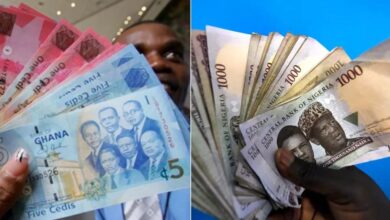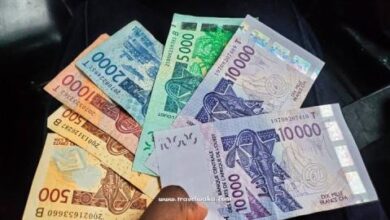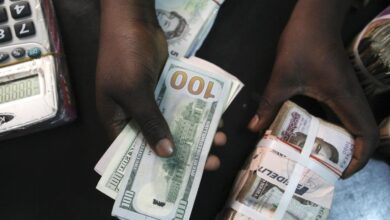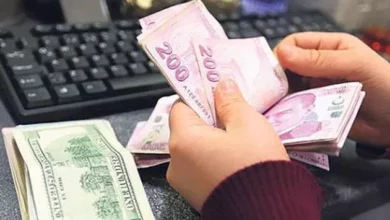Pounds To Naira Black Market and Official CBN Exchange Rate Today
What is Pound To Naira Official CBN and Black Market Exchange Rate Today?
The value of the Naira has been reducing for quite a long and there has not been a better solution to this. It was predicted that 1 pound sterling could result in ₦1000 in the future but hope is not true.
The federal government has undertaken several measures to see an improvement in the value of the naira, but it appears that none of those efforts is paying off.
They enforced a restriction on the importation of certain goods with the belief that this would result in a reduction in the demand for foreign currencies such as the pound sterling.
But, it had no positive effect on the situation. The naira depreciated against the pound sterling during this period, more so than at any other point in history.
The federal government also made more efforts to curb the value of the naira, which was the forceful pegging of the exchange rate with a refusal to weaken the currency.
This strategy, like the others, was unsuccessful since it was unable to halt the continuing devaluation of the naira of key global currencies.
In this article, we will discuss the pounds to naira black market exchange rate and some of the factors that must have been responsible for the fall in the naira currency and why the federal government appears to be helpless in the situation.
Pounds To Naira Black Market Exchange Rate Today
The naira devaluation is clear to everyone that the federal government must be lacking something, which is the reason for its failure to steer the direction of the nation’s currency back to the road it followed in the good old days.
Pounds to Naira black market rates are listed below;
Buying @ 1 Pound = ₦870.00
Selling @ 1 Pound = ₦880.00
Pounds to Naira Official CBN Exchange Rate Today
Buying @ 1 Pound = ₦502.00
Selling @ 1 Pound = ₦505.00
Factors Influencing The Naira To Pounds Exchange Rate
High Importation Rate
Any economy that is heavily dependent on imports is likely to suffer the same way the naira currency is currently experiencing. To give an idea of how awful the situation is in Nigeria, almost everything is nearly imported to the extent of importing toothpicks.
Few cars were manufactured in Nigeria, however, the majority of Nigerians buy imported cars. The Nigerian naira is suffering from the effects of a weakening economy as a result of the rising rate of importation.
Because Nigerians have such a strong desire for imported items, they have to pay a higher price for foreign currencies such as the pound sterling.
As a result of the increased demand for scarce foreign currency, the situation has developed to the point where a significant volume of naira is actively seeking out the scarce pound item.
When the law of demand takes effect, it creates a situation in which more money is required to buy the pounds. This, in turn, causes the value of the naira to decrease as a result.
Unfavourable Government Policies
The implemented policy by the government has not been helpful and has been making situations worse.
If the value of the naira needs to be increased, then the government should keep it cool and get more serious about bringing about the kind of change that Nigerians want to see.
Although the government may not have made any public statement regarding the devaluation of the naira, it is abundantly obvious to anyone that the naira has already been unofficially devalued.
Demand For Foreign Exchange
Many Nigerians place a higher value on foreign currency than they do on their country’s official unit currency.
The worth of the foreign currencies, as well as their security, is enhanced by the fact that there is a greater possibility to appreciate, leading to an increase in their owners’ wealth.
The value of the naira will decrease when there is a rise in demand for another currency. Nigerians must begin to change their orientation to boost the naira, just as the government also needs to change its orientation for things to get better.
Certain schools in Nigeria accept payments in currencies other than the local currency for tuition. There are some rental properties in which the landlord requires payment in a non-local currency.
Also, there are certain independent contractors and other service providers who demand to be compensated in a currency other than the domestic one.
The naira’s value has been steadily declining as a result of several issues, including those listed above as well as many others.
Decrease In The Value Of Crude Oil
As of 2014, the price of a barrel of crude oil was quite more than $100. However, it began to lose value when Iran started exporting crude oil.
This led to an increase in output, and the law of demand and supply also kicked in, which resulted in a decrease in the value of crude oil.
There was a time when the price of a barrel of crude oil was as low as $38, but it eventually recovered. Because of this condition, there is a lack of available foreign currency in Nigeria.
Do not forget that Nigeria is almost a one-industry nation, which implies that the main contributor to Nigeria’s gross domestic product (GDP) is crude oil.
The decline in the price of crude oil also contributed to a drop in GDP, which in turn led to a drop in the value of the naira because more naira is required to purchase the same amount of foreign currency as before.
Public Fund Looting
There are many politicians and government employees who steal money from the public. They regard the country’s resources as a National Cake that everyone should get a piece of.
There was a significant amount of money that had been taken by politicians and government officials at all levels of government, including the federal, state, and municipal levels.
This is having a very negative impact on the naira. To make a bad situation even worse, majorly the money that is stolen is in another country’s currency.
After being stolen, such money is removed from circulation in Nigeria rather than being kept in circulation. Instead, they are transferred to banks located in other countries.
As a direct consequence of this, other nations have benefited from the stolen money, whilst Nigeria, the rightful owner of the funds, has continued to endure hardship.
Solutions To Factors Affecting The Naira Rate
At this point, the naira may not be able to help itself, and it places a significant amount of dependence on Nigerians. At this point, things don’t look very hopeful, and there doesn’t appear to be any solution.
On the other hand, Nigerians can turn things around by taking on a more ethical attitude toward their country. Those who steal from public funds should begin to engage in self-reflection and put an end to their immoral ways of living.
The government should also be honest about cash collected from looters of public funds, and they should ensure that such monies are made available promptly so that they can be reintroduced into the economy of Nigeria.
Nigerians should refrain from their unjustifiable search for foreign items, as this will contribute further to the strength of the naira currency.
It is suggested that Nigerians should start supporting domestically produced goods rather than purchasing things from countries such as the United Kingdom, the United States, or China.
The value of the naira will almost certainly strengthen if there is an increase in the number of people purchasing items created in Nigeria; this is because there would be a greater demand for the currency than there has ever been before.
It is time for governments to amend their ineffective policies. Policies that set limitations on homemade products need to be examined, and the market needs to be accommodating to everyone.
Instead of importing these commodities from other countries, manufacturing enterprises in Nigeria should procure their raw materials from the large pool of raw materials already present in Nigeria.
This would lighten the load on foreign currencies and will assist in the naira’s recovery within a reasonable time.
It is high time Nigerians started thinking about other ways of increasing the country’s gross domestic product (GDP), given that no one is certain when the price of crude oil will start to rise again.
It is now time for Nigerians to start farming on a larger scale.
Nigeria has a large enough population to produce its food. We ought to be able to produce sufficient food to even export it, and this is one of how the naira might be strengthened.
Those who are interested in entering the agricultural industry should also receive aid from the government. The strain on the naira will be relieved as a result of this, and the domestic manufacturing of goods will receive a boost as a result as well.
Nigerians will never have to hunt for foreign exchange to import foods, and we will be able to earn foreign currency to contribute to the GDP of the country.
Pound To Naira Black Market Exchange Rate Frequently Asked Questions
What Is The Rate Of 1 Pound In Naira In The Black Market?
Pounds to Naira black market rates are listed below;
Buying @ 1 Pound = ₦870.00
Selling @ 1 Pound = ₦880.00
What Is Aboki Rate?
The exchange rate for dollars on the black market, also known as the Aboki market, is typically higher than the rate at the banks, which is regulated by the Central Bank of Nigeria (CBN).
You can buy or sell dollars for naira at the rate that is listed on the CBN dollar-to-naira website, which is cbn.gov.ng. This rate is known as the CBN Exchange rate.
How Does Black Market Exchange Rate Work?
When transactions involving foreign currency take place at an unofficial or unlawful exchange rate, this gives rise to the existence of a black market. If a central bank does not intervene in the foreign exchange market, it is quite possible that a black market would occur, and the central bank will lose control of the exchange rate.
Who Benefits The Back Market?
People can trade goods or services that are restricted in their own countries through the use of black marketplaces. They come into existence when vendors attempt to avoid paying taxes on particular commodities.
Because of this, these deals do not get documented, and neither the sellers nor the buyers have to hand over any money to their respective governments.
Conclusion
There had been a great deal of discussion regarding the issue at hand and the potential solutions. The question that has to be answered now is whether the people and administration of Nigeria are truly ready for change.
If we do not change the way we feel about Nigeria, then unfortunately for the naira, its value will continue to decline.



